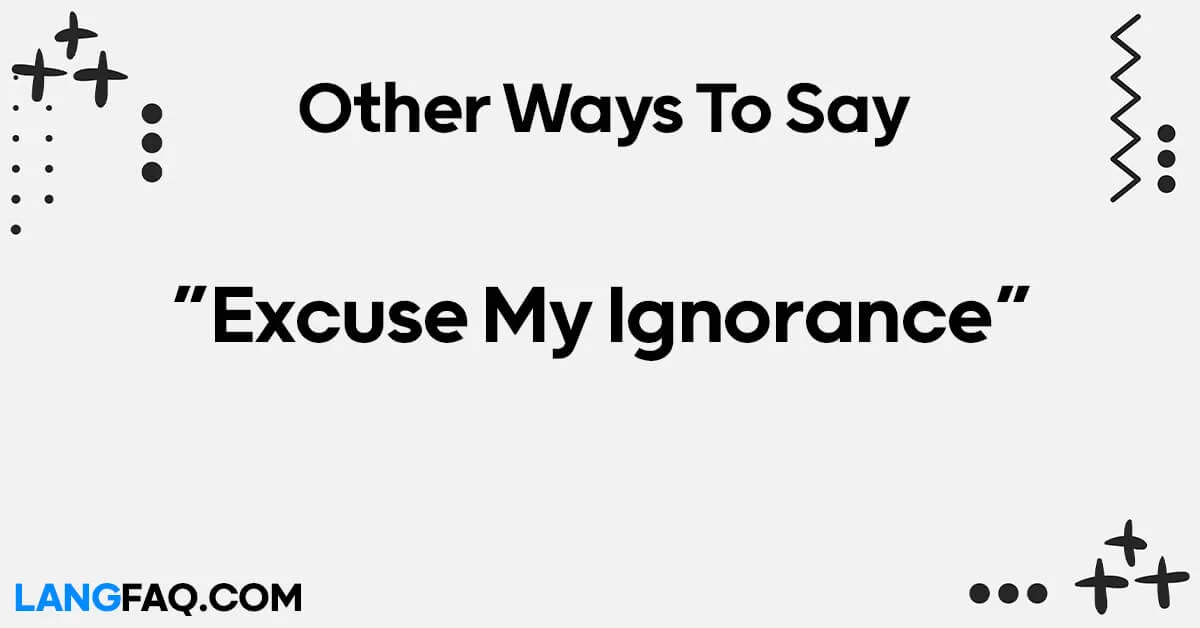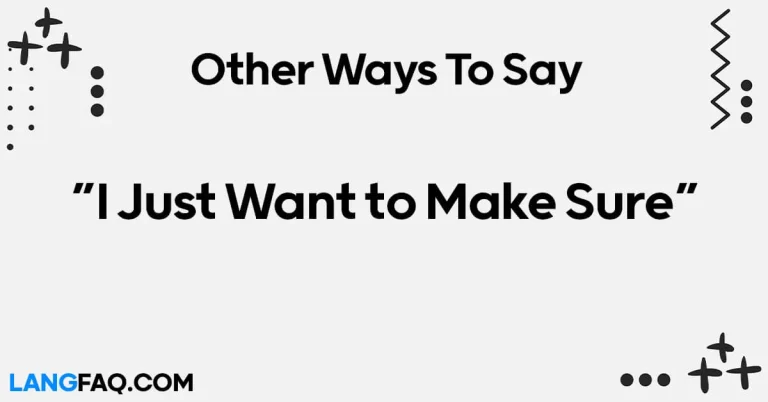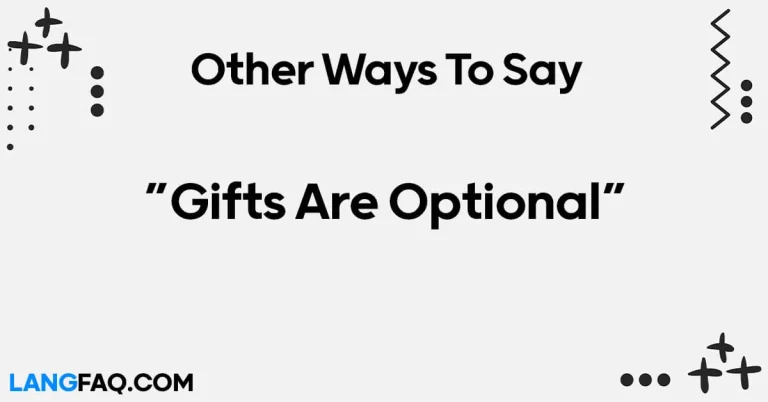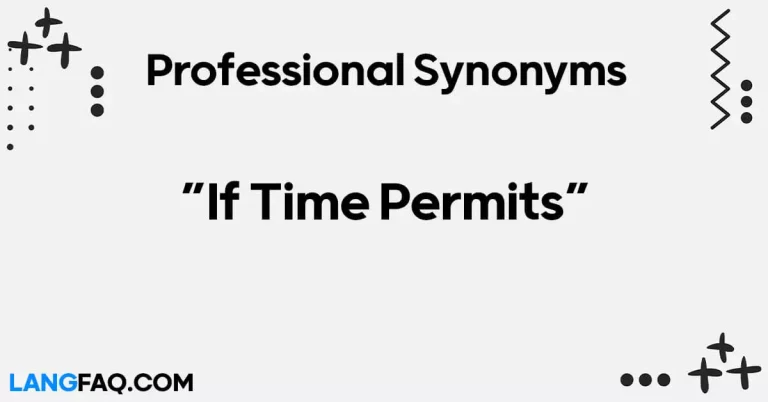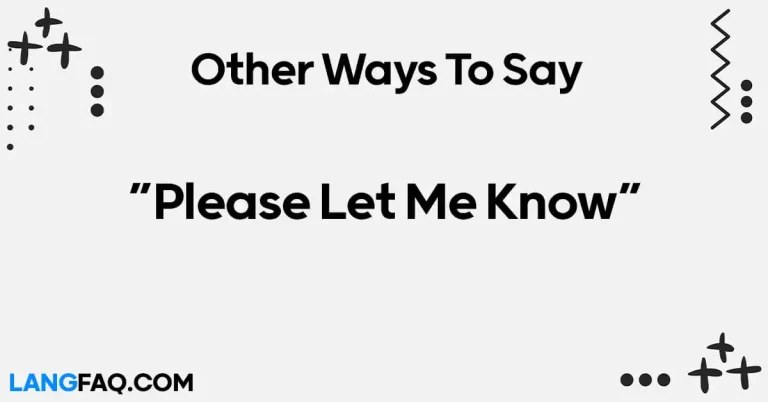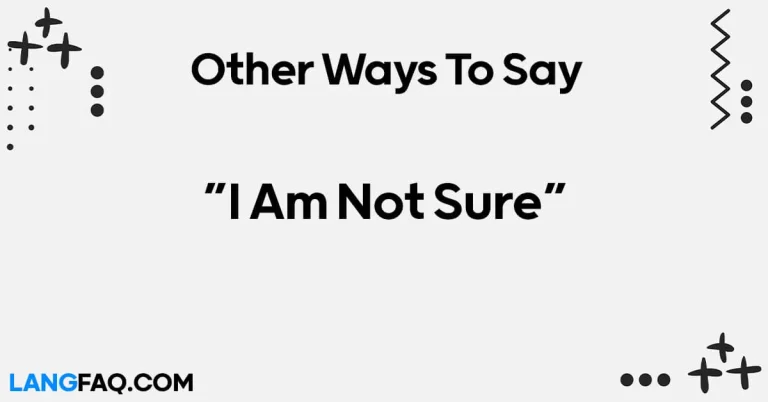In the vast landscape of language, expressing humility and acknowledgment of gaps in knowledge is crucial. This article delves into 12 Other Ways to Say “Excuse My Ignorance,” offering insights and alternatives that enrich your conversational toolkit. Enhance your communication skills and explore diverse ways to navigate moments of uncertainty with grace and politeness.
12 Other Ways to Say “Excuse My Ignorance”
Here are 12 alternative ways to express “Excuse My Ignorance”:
- Pardon My Lack of Knowledge
- Apologies for My Unfamiliarity
- Kindly Excuse My Lack of Insight
- Regrettably, I’m Not Informed About That
- My Apologies, I’m Not Well-Versed
- I’m Afraid I Don’t Have Information on That
- Excuse Me, I’m Not Familiar With That Topic
- Allow Me to Learn More About That
- I Appreciate Your Patience as I Catch Up
- Could You Enlighten Me on That Matter?
- I’m Eager to Gain More Insight Into This
- My Knowledge on This Subject Is Limited
Here’s a table with meanings and examples for the 12 alternative ways to express “Excuse My Ignorance”:
| Expression | Meaning | Example |
|---|---|---|
| Pardon My Lack of Knowledge | Apology for not having the required knowledge | “Pardon my lack of knowledge on this specific topic.” |
| Apologies for My Unfamiliarity | Expressing regret for being unfamiliar | “Apologies for my unfamiliarity with the details of the project.” |
| Kindly Excuse My Lack of Insight | Polite request for understanding | “Kindly excuse my lack of insight; I’m still learning.” |
| Regrettably, I’m Not Informed About That | Expressing regret for lack of information | “Regrettably, I’m not informed about the recent developments.” |
| My Apologies, I’m Not Well-Versed | Acknowledging a lack of expertise | “My apologies, I’m not well-versed in the technical aspects.” |
| I’m Afraid I Don’t Have Information on That | Expressing uncertainty | “I’m afraid I don’t have information on that specific issue.” |
| Excuse Me, I’m Not Familiar With That Topic | Polite interruption due to lack of knowledge | “Excuse me, I’m not familiar with that topic; could you elaborate?” |
| Allow Me to Learn More About That | Seeking permission for further exploration | “Allow me to learn more about the project before commenting.” |
| I Appreciate Your Patience as I Catch Up | Recognizing others’ understanding | “I appreciate your patience as I catch up with the discussion.” |
| Could You Enlighten Me on That Matter? | Requesting clarification or information | “Could you enlighten me on that matter? I’d like to understand.” |
| I’m Eager to Gain More Insight Into This | Expressing enthusiasm for learning | “I’m eager to gain more insight into this fascinating subject.” |
| My Knowledge on This Subject Is Limited | Acknowledging a restricted understanding | “My knowledge on this subject is limited, but I’m willing to learn.” |
These phrases provide a diverse range of polite ways to express a lack of knowledge or understanding in various situations. They contribute to effective communication by combining humility with a commitment to learning, fostering positive interactions.
Is It Correct to Say “Excuse My Ignorance”?
Using the phrase “Excuse My Ignorance” is absolutely correct and serves as a polite acknowledgment of not having complete knowledge on a particular subject. This expression is often used to convey humility and a readiness to learn when faced with unfamiliar information.
When to Use “Excuse My Ignorance”:
In both formal and informal settings, this phrase is suitable when:
- Formal Settings: It can be employed professionally during meetings or presentations, showcasing a willingness to admit gaps in knowledge. For instance, “Excuse my ignorance on the latest industry regulations; I haven’t had the chance to review them thoroughly.”
- Social Situations: In casual conversations, it is effective to gracefully admit unfamiliarity with a topic while maintaining a respectful and open-minded tone. For example, “Excuse my ignorance about the rules of this board game; I’m still getting the hang of it.”
Variations for Different Relationships:
Tailor the expression based on the nature of your relationship:
Colleagues or Professional Relationships:
“Apologies for any gaps in my understanding regarding the project timeline; I appreciate your patience.”
Friends or Casual Settings:
“Sorry if I seem out of the loop on recent pop culture; please excuse my ignorance, I’ve been busy with other things.”
Tips:
- Use the phrase sincerely and maintain a positive tone to convey a genuine desire to learn.
- Combine it with specific questions or requests for clarification to demonstrate active engagement.
- Express gratitude when others provide information or insights.
Professional Mail Example With “Excuse My Ignorance”
Subject: Seeking Clarification on Recent Project Developments
Dear [Recipient’s Name],
I trust this email finds you well.
I am reaching out regarding the recent updates to our project. Excuse my ignorance, but I haven’t had the opportunity to delve into the details as thoroughly as I would have liked.
Could you kindly provide some insights or direct me to the relevant documentation? I want to ensure that I am up-to-date and aligned with the latest developments to contribute effectively to our team’s success.
Your understanding and assistance are highly appreciated. Looking forward to your guidance.
Best regards, [Your Full Name] [Your Position] [Your Contact Information]
Pardon My Lack of Knowledge
In the vast world of communication, admitting when you lack information is an art. “Pardon My Lack of Knowledge” stands as a gracious acknowledgment, blending humility with the desire to learn. This phrase is versatile, suitable for both formal and informal contexts, making it an excellent choice when addressing a knowledge gap.
Scenario: Formal Context – Workplace Meeting During a professional meeting, when confronted with an unfamiliar topic, you can gracefully say, “Pardon my lack of knowledge on this matter. Could you provide more context or background?”
Informal Context – Friend’s Conversation In casual conversations, it works just as well. For instance, if discussing a niche hobby, you might say, “Pardon my lack of knowledge about vintage cars; I’m not well-versed in that area.”
Example Sentence: “Excuse me, colleagues, but pardon my lack of knowledge on the latest software update; I haven’t had a chance to explore its features thoroughly.”
Email Sample:
Subject: Seeking Clarification on Agenda Item
Dear [Recipient’s Name],
I hope this email finds you well. Pardon my lack of knowledge on the recent developments discussed in our last meeting. Could you please share more details or direct me to the relevant documentation? I appreciate your assistance.
Best regards, [Your Name]
Apologies for My Unfamiliarity
In situations where you find yourself navigating uncharted territory, expressing your unfamiliarity politely becomes crucial. “Apologies for My Unfamiliarity” is a phrase that communicates sincerity and a willingness to bridge the knowledge gap.
Scenario: Formal Context – Project Collaboration In a professional setting, if assigned to a project outside your usual expertise, you might say, “Apologies for my unfamiliarity with this specific domain. I am eager to learn and contribute effectively.”
Informal Context – Social Gathering During a social gathering, when discussing a topic you’re not familiar with, this phrase helps maintain a respectful tone. For example, “Apologies for my unfamiliarity with the latest trends in pop culture; I’ve been engrossed in other projects.”
Example Sentence: “Apologies for my unfamiliarity with the intricacies of this financial report. Could someone provide a brief overview to bring me up to speed?”
Email Sample:
Subject: Clarification on Project Parameters
Dear [Recipient’s Name],
I hope this email finds you in good spirits. Apologies for my unfamiliarity with some aspects of the project requirements. Could you spare some time for a brief meeting to clarify certain parameters? Your guidance is highly appreciated.
Best regards, [Your Name]
Kindly Excuse My Lack of Insight
When expressing a need for understanding, “Kindly Excuse My Lack of Insight” strikes a balance between humility and a genuine desire to gain knowledge. This phrase is effective in various settings, emphasizing courtesy and openness.
Scenario: Formal Context – Client Presentation In a client presentation where a specific industry trend is discussed, you might say, “Kindly excuse my lack of insight into recent market fluctuations. I am committed to researching and providing a comprehensive analysis for our next meeting.”
Informal Context – Family Discussion During a family discussion about a niche hobby, expressing your lack of insight politely is essential. For instance, “Kindly excuse my lack of insight into the intricacies of video game strategies; I’m still learning the ropes.”
Example Sentence: “Kindly excuse my lack of insight into the intricacies of this new software. I am in the process of attending training sessions to enhance my understanding.”
Email Sample:
Subject: Request for Clarification on Project Goals
Dear [Recipient’s Name],
I trust this email finds you well. Kindly excuse my lack of insight into some of the project goals. Could we schedule a brief meeting to discuss and clarify these aspects? Your cooperation is highly valued.
Best regards, [Your Name]
Regrettably, I’m Not Informed About That
When transparency is key, “Regrettably, I’m Not Informed About That” becomes a powerful phrase. It communicates a genuine acknowledgment of one’s lack of information while maintaining a professional tone.
Scenario: Formal Context – Team Discussion During a team discussion about a recent policy change, you might say, “Regrettably, I’m not informed about the details of the new policy. Could someone provide an overview for the team?”
Informal Context – Networking Event In a casual conversation at a networking event, if a topic outside your expertise arises, you can gracefully admit, “Regrettably, I’m not informed about the latest advancements in technology. I’d love to hear more from you.”
Example Sentence: “Regrettably, I’m not informed about the specifics of the budget allocation for this quarter. Could the finance team provide more details in our next meeting?”
Email Sample:
Subject: Seeking Clarification on Project Updates
Dear [Recipient’s Name],
I hope this email finds you well. Regrettably, I’m not informed about the recent updates to the project timeline. Could you kindly share the latest information or direct me to the relevant documentation? Your assistance is highly appreciated.
Best regards, [Your Name]
My Apologies, I’m Not Well-Versed
Acknowledging a lack of expertise gracefully, “My Apologies, I’m Not Well-Versed” is a phrase suitable for both formal and informal settings. It conveys sincerity and a commitment to learning.
Scenario: Formal Context – Business Meeting In a business meeting discussing legal matters, if you lack legal expertise, you might say, “My apologies, I’m not well-versed in legal terminology. Could someone clarify the implications for our project?”
Informal Context – Book Club Discussion During a book club discussion on a complex literary work, admitting your lack of familiarity can be done with finesse: “My apologies, I’m not well-versed in analyzing symbolism in literature. I’d appreciate insights from those more experienced.”
Example Sentence: “My apologies, colleagues, but I’m not well-versed in coding languages. If someone could assist me with this task, I’d be grateful.”
Email Sample:
Subject: Assistance Required for Technical Task
Dear [Recipient’s Name],
I trust this email finds you well. My apologies, but I’m not well-versed in the coding languages required for the upcoming project task. Could you provide guidance or recommend resources for a quick learning curve? Your support is invaluable.
Best regards, [Your Name]
I’m Afraid I Don’t Have Information on That
Choosing honesty and professionalism, “I’m Afraid I Don’t Have Information on That” is a phrase that conveys transparency. It’s a versatile expression suitable for a variety of contexts.
Scenario: Formal Context – Client Inquiry When a client inquires about a specific market trend, you might say, “I’m afraid I don’t have information on that particular trend. However, I can research it thoroughly and provide a detailed report by the end of the week.”
Informal Context – Social Gathering In a social setting, if a friend discusses a niche hobby you’re unfamiliar with, admitting your lack of information is both genuine and respectful: “I’m afraid I don’t have information on the latest developments in that video game; I’ve been occupied with other projects.”
Example Sentence: “Colleagues, I’m afraid I don’t have information on the recent changes to our internal processes. Can someone brief me during our next team meeting?”
Email Sample:
Subject: Request for Information on Project Updates
Dear [Recipient’s Name],
I hope this email finds you well. I’m afraid I don’t have information on the recent updates to our project goals. Could you kindly provide a summary or direct me to the relevant documents? Your assistance is highly appreciated.
Best regards, [Your Name]
Excuse Me, I’m Not Familiar With That Topic
Navigating conversations gracefully, “Excuse Me, I’m Not Familiar With That Topic” is a polite interruption that acknowledges your lack of familiarity. This phrase is suitable for both formal and informal contexts, ensuring clear communication.
Scenario: Formal Context – Conference Call During a conference call discussing a technical aspect you’re unfamiliar with, you might politely interrupt, saying, “Excuse me, I’m not familiar with that topic. Could someone provide a brief overview for better context?”
Informal Context – Social Event In a friendly discussion about a niche interest, using this phrase maintains a respectful tone: “Excuse me, I’m not familiar with the intricacies of that board game. Could you explain the rules briefly?”
Example Sentence: “Excuse me, team, but I’m not familiar with that topic in the agenda. Could we take a moment for clarification before proceeding?”
Email Sample:
Subject: Seeking Clarification on Meeting Agenda
Dear [Recipient’s Name],
I trust this email finds you in good health. Excuse me if I’m not familiar with some topics on the meeting agenda. Could you provide a brief overview or direct me to relevant documents? Your assistance is highly valued.
Best regards, [Your Name]
Allow Me to Learn More About That
Expressing a proactive approach, “Allow Me to Learn More About That” invites collaboration and showcases your commitment to expanding your knowledge base. This phrase is effective in both professional and personal settings.
Scenario: Formal Context – Team Discussion During a team discussion on a new project, you might say, “Allow me to learn more about the specific requirements. I’ll dedicate time this week to thoroughly understand the project goals and contribute effectively.”
Informal Context – Family Gathering In a family gathering discussing a hobby you’re less familiar with, expressing your eagerness to learn adds a positive note: “Allow me to learn more about this board game. I’m excited to delve into the rules and join the next game night.”
Example Sentence: “Colleagues, allow me to learn more about the client’s expectations for this project. I’ll schedule individual meetings to gather insights from each team member.”
Email Sample:
Subject: Request for Information on Project Requirements
Dear [Recipient’s Name],
I hope this email finds you well. Allow me to learn more about the specific requirements for the upcoming project. Could we schedule a brief meeting to discuss and clarify any uncertainties? Your cooperation is highly appreciated.
Best regards, [Your Name]
I Appreciate Your Patience as I Catch Up
Recognizing the support of others, “I Appreciate Your Patience as I Catch Up” conveys gratitude while admitting your need to catch up on certain information. This phrase is suitable for various professional and personal contexts.
Scenario: Formal Context – Team Collaboration In a team collaboration where you need time to catch up on project updates, you might express, “I appreciate your patience as I catch up on the latest project developments. Your support is invaluable.”
Informal Context – Study Group In a study group where you’re trying to grasp a challenging concept, expressing gratitude for your peers’ patience is essential: “I appreciate your patience as I catch up on the complex theories. Your explanations have been immensely helpful.”
Example Sentence: “Team, I appreciate your patience as I catch up on the new software functionalities. If there are any tutorials or resources you recommend, please share them.”
Email Sample:
Subject: Gratitude for Support During Learning Process
Dear [Recipient’s Name],
I trust this email finds you in good spirits. I wanted to express my gratitude for your ongoing support and patience as I catch up on the project requirements. Your guidance is instrumental, and I look forward to contributing effectively.
Best regards, [Your Name]
Could You Enlighten Me on That Matter?
Inviting knowledge-sharing, “Could You Enlighten Me on That Matter?” fosters a collaborative atmosphere in conversations. This phrase encourages others to share their insights, promoting a positive exchange of information.
Scenario: Formal Context – Business Presentation During a business presentation where a complex concept is discussed, you might ask, “Could you enlighten me on that matter? I want to ensure a thorough understanding for our upcoming client meeting.”
Informal Context – Book Club Discussion In a book club discussion where a challenging theme arises, using this phrase shows openness to different interpretations: “Could you enlighten me on that matter? I’m curious about how others perceive this subplot.”
Example Sentence: “Colleagues, could you enlighten me on that matter in the report? I want to ensure accurate analysis before our client presentation.”
Email Sample:
Subject: Request for Clarification on Project Details
Dear [Recipient’s Name],
I hope this email finds you well. Could you enlighten me on certain aspects of the project details? I want to ensure a comprehensive understanding as we move forward. Your expertise is highly valued.
Best regards, [Your Name]
I’m Eager to Gain More Insight Into This
Expressing enthusiasm for learning, “I’m Eager to Gain More Insight Into This” signals a proactive approach to knowledge acquisition. This phrase is effective in showcasing your commitment to ongoing self-improvement.
Scenario: Formal Context – Training Session During a training session where new methodologies are introduced, you might express, “I’m eager to gain more insight into this. Are there additional resources or workshops I can attend to deepen my understanding?”
Informal Context – Networking Event In a networking event discussing emerging trends, expressing eagerness to learn enhances your engagement: “I’m eager to gain more insight into this industry. Could you recommend any upcoming conferences or webinars?”
Example Sentence: “Team, I’m eager to gain more insight into the client’s expectations for the upcoming project. Let’s schedule a meeting to ensure everyone is on the same page.”
Email Sample:
Subject: Seeking Further Insight on Project Goals
Dear [Recipient’s Name],
I trust this email finds you in good health. I’m eager to gain more insight into the specific goals of our upcoming project. Could we schedule a meeting to discuss any nuances and ensure alignment? Your collaboration is greatly appreciated.
Best regards, [Your Name]
My Knowledge on This Subject Is Limited
Emphasizing transparency, “My Knowledge on This Subject Is Limited” conveys honesty and integrity in your communication. This phrase is versatile, suitable for various formal and informal contexts.
Scenario: Formal Context – Client Consultation During a client consultation where a technical question arises, you might say, “My knowledge on this subject is limited. I will consult with our technical team and provide a detailed response shortly.”
Informal Context – Social Gathering In a social gathering discussing a specialized interest, admitting your limited knowledge maintains authenticity: “My knowledge on this subject is limited, but I’m eager to learn more. Could you share your insights?”
Example Sentence: “Dear colleagues, my knowledge on this subject is limited. I’ll conduct further research and provide a comprehensive overview in our next team meeting.”
Email Sample:
Subject: Acknowledgment of Limited Knowledge
Dear [Recipient’s Name],
I hope this message finds you well. My knowledge on this subject is limited, and I want to ensure accurate information. I will delve into the details and share my findings during our next team briefing. Thank you for your understanding.
Best regards, [Your Name]
FAQs About Expressing Ignorance
How can I politely admit to not knowing something?
Expressing humility is key. Use phrases like “Pardon My Lack of Knowledge” or “I’m Afraid I Don’t Have Information on That” to convey your lack of knowledge politely.
What if I’m unfamiliar with a topic in a professional setting?
Maintain professionalism with phrases like “Apologies for My Unfamiliarity” or “Regrettably, I’m Not Informed About That” to navigate unfamiliar topics gracefully.
Is it okay to ask for clarification when admitting ignorance?
Absolutely. Phrases like “Could You Enlighten Me on That Matter?” invite collaboration and show your eagerness to learn.
How do I balance expressing ignorance without appearing incompetent?
Choose phrases that emphasize a commitment to learning, such as “I’m Eager to Gain More Insight Into This” or “Allow Me to Learn More About That.”
Can expressing ignorance be an opportunity for building connections?
Certainly. Using phrases like “Excuse Me, I’m Not Familiar With That Topic” can foster open communication and create opportunities for knowledge-sharing.
How can I show appreciation for others’ patience when I lack knowledge?
Demonstrate gratitude with phrases like “I Appreciate Your Patience as I Catch Up,” highlighting your acknowledgment of others’ understanding.
Conclusion
In the tapestry of human interaction, admitting ignorance is a thread of humility and growth. Embrace the diverse ways to express “Excuse My Ignorance” outlined in this article. Let these phrases become tools in your communication arsenal, enriching your interactions and fostering a culture of continuous learning.

